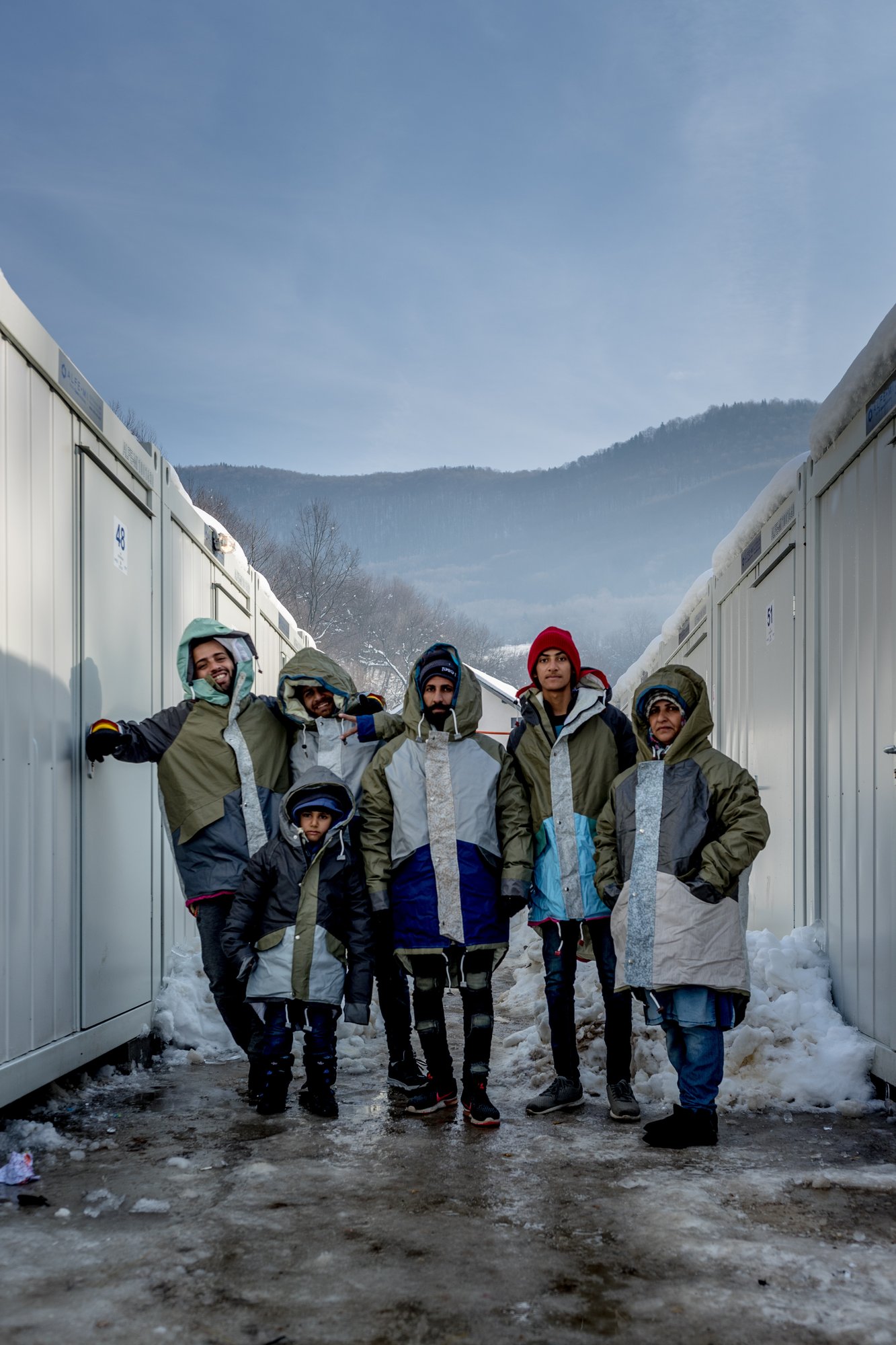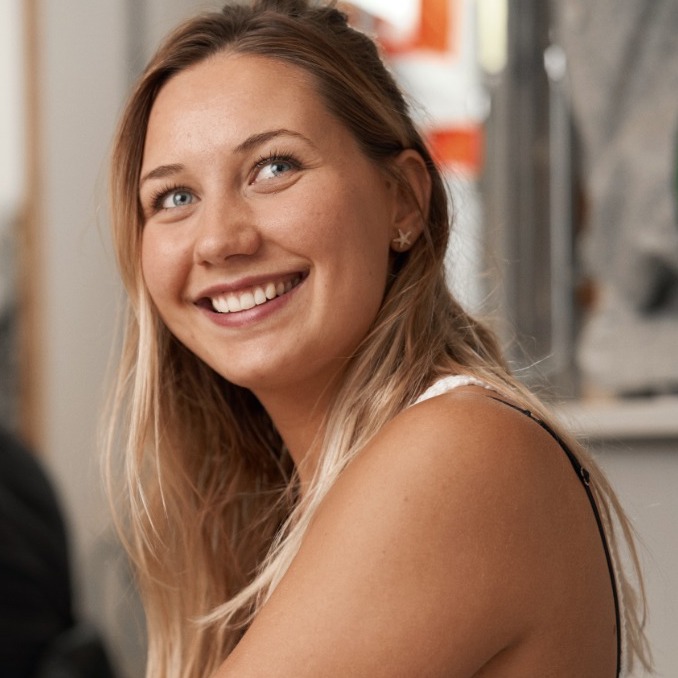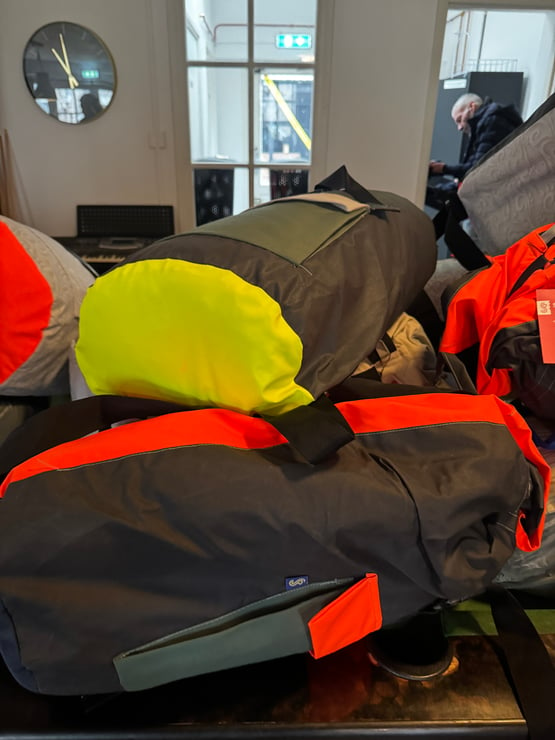Huge support from Twente
Over a thousand people from Twente handed in their old sleeping bags in December following an appeal in our newspaper, with the aim of dragging a refugee through the harsh winter months. Reporter Jadrike Boels traveled with one of those sleeping bags to a refugee camp in freezing Bosnia. A story about how an old sleeping bag from Twente offers hope in Sarajevo.
It is cold. Freezing cold. Large mounds of snow line a road glazed with a thick layer of ice. A man in a T-shirt carefully slides his flip-flops across the slippery road surface. Over his head and shoulders he wears a thin blanket against the cutting wind. His bare arms are wrapped tightly around him. Beside him, children are playing. They screech as they throw snow and large clumps of ice. The man doesn't seem to hear and shuffles on. His gaze is hopeless. As is his future.
Trap for refugees
He is one of 550 men, women and children trapped in a refugee camp on the outskirts of Sarajevo. The city, which not long ago was itself a war zone, has turned into a trap for refugees. People who have escaped war, in Syria and Afghanistan, among other places, are stuck in Bosnia by the closed borders of Hungary and Croatia. The poorest country in the region. The beautiful life in Western Europe that the refugees dream of seems unattainable. But with the arrival of a truck full of special, warm suits from Twente, hope once again shines on the horizon.

Saving lives
That chance for hope for one of the 550 refugees began two weeks ago in Borne. At home with Marianne van der Berg. The 65-year-old's cozy home is completely dedicated to Christmas. Pine branches with lights adorn the walls, a homemade nativity scene adorns the windowsill and the heating is nice and high. "I've always been warm. I've always had food and a roof over my head."
That this is not the most normal thing in the world, the Born native realized when she read the appeal of the Sheltersuit Foundation in this newspaper. An urgent appeal to hand in old sleeping bags, which are then made into warm coats for refugees living in camps where the cold is life-threatening.
"Why should I keep something that might save a life?" On Marianne's lap is a sleeping bag with a variegated 1970s print. She strokes the thick fabric. "I'll improvise if guests come, we have enough junk to keep us warm." Born is visibly touched. "We spend billions on presents in December and in a refugee camp some people don't even have anything on their feet. It's so unfair." A small gesture, Marianne calls her donation. "But I hope that for the refugee who receives my sleeping bag it is a big step forward."
A Thousand
About a thousand other people from Twente also scoured their attics for old sleeping bags and made the same gesture. In the factory of the Sheltersuit Foundation in Enschede in December, a lot of hard work went into transforming all those sleeping bags into warm, water- and windproof jackets with a zip-on sleeping bag. The first shipment of so-called sheltersuits, containing Marianne's sleeping bag, left December 13 for Sarajevo.
‘So happy’
A week later, it is 18-year-old Khalid from Afghanistan who receives Marianne's Sheltersuit. "I'm so happy," the boy says as he lifts up the jacket. He smiles when he sees the variegated print. "Not really pretty, but the jacket is very important. It's so cold here."
Four months ago, Khalid fled his homeland. As an interpreter for the U.S. Army in Kabul, he had a comfortable life. That changed when the army no longer needed his services.
Turkey
Together with his three brothers, he fled the country. On foot, the boys traveled to Turkey. From there, they made the crossing by boat to Greece. "It was so hard, and so cold," he said. Their goal was to seek asylum in Germany, but because of the heavily protected borders of Croatia and Hungary, the brothers got no further than Bosnia. (text continues below photo)

Onderkoeling
Khalid zit inmiddels drie maanden ‘vast’ in het migrantenkamp in Sarajevo. Een kamp waar hij het relatief goed heeft. Dankzij donaties van de Verenigde Naties zijn er sanitaire voorzieningen, is er eten en staan er een paar containers waar een deel van de vluchtelingen in kan verblijven. De rest verblijft in tentjes die zijn opgezet in een oude loods. Het dak boven hun hoofd houdt de kou niet tegen. Het kwik daalt regelmatig tot min 20 graden. Meerdere vluchtelingen raakten de afgelopen maand onderkoeld. „Hier waren we niet op voorbereid. We konden maar weinig spullen meenemen, anders was het te zwaar om te tillen”, doelt Khalid op de strenge winter. „Het is echt vreselijk koud.”
The game
De 18-jarige heeft ‘geluk’. Hij is kortgeleden ‘gepromoveerd’ naar een container inclusief kleine radiator. Hij verblijft in het hok met vijf andere mannen. Toch heeft Khalid de jas van Marianne hard nodig. Het is meer dan een middel om warm te blijven. Het is een baken van hoop. De Kroatische grens, voor Khalid de poort naar een beter leven, lonkt. Ondanks de risico’s wagen elke dag vluchtelingen de gok. Ze noemen het ‘the game’, het kat-en-muisspel met de grenspolitie. De politie en de vrieskou vormen, naast wilde dieren en overgebleven landmijnen uit de Bosnische burgeroorlog, het grootste gevaar tijdens ‘the game’.
Migranten die worden gepakt in Kroatië, worden op hardhandige wijze en zonder procedure uitgezet naar Bosnië. Daar begint het spel opnieuw. „Mensen komen terug in het kamp met gebroken armen en verwondingen”, vertelt Khalid. Ook hij werd tijdens zijn eerste poging om de grens over te steken flink toegetakeld. „Ik ben tegen mijn hoofd geschopt, geslagen met een stroomstootwapen en ik moest in ijskoud water springen.”

Reis nog niet ten einde
Maar hij moet en zal weg uit Bosnië. Kosten wat het kost. „Hier is niks voor mij. De eigen bevolking heeft niet eens werk. Ik wil een betere toekomst.” Met zijn nieuwe sheltersuit, kan Khalid het risico op onderkoeling wegstrepen. Het is één angst minder. „Ik wil naar Duitsland om dokter te worden, zodat ik mensen kan helpen. Net zoals de mensen die mij onderweg hebben geholpen.”
Marianne is een van die mensen. Khalid is haar enorm dankbaar. Haar oude slaapzak geeft meer dan alleen fysieke warmte: het biedt hoop. Hoop op een beter leven. Daarmee komt ook Marianne’s kerstwens uit: met een klein gebaar maakt ze een groot verschil. En met haar zo’n duizend andere Tukkers. Of het Khalid daadwerkelijk lukt de grens over te steken en zijn dromen waar te maken zal de tijd leren.


















